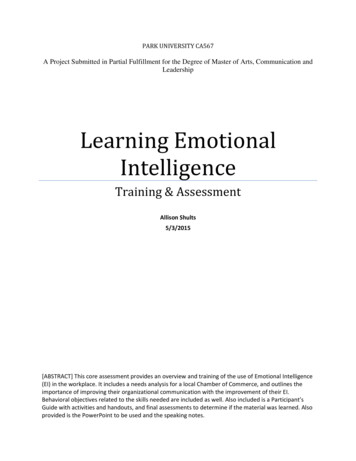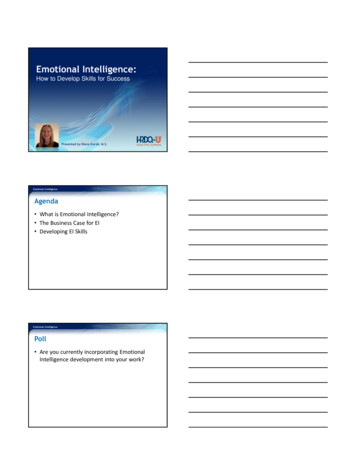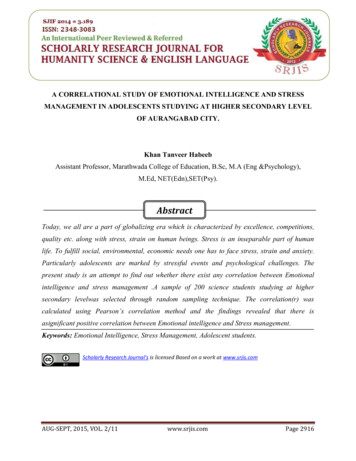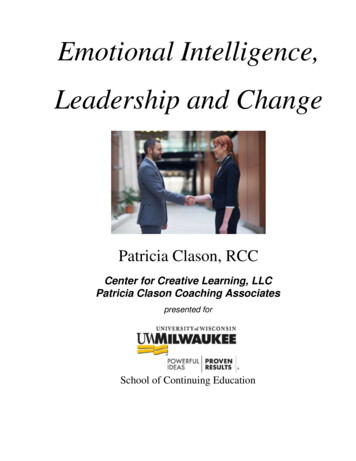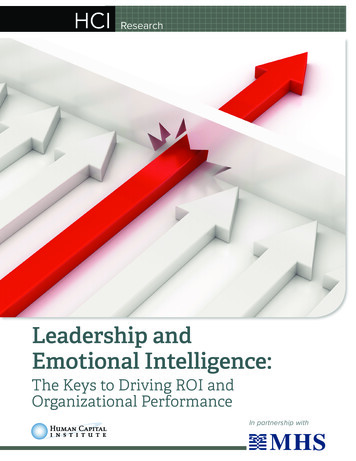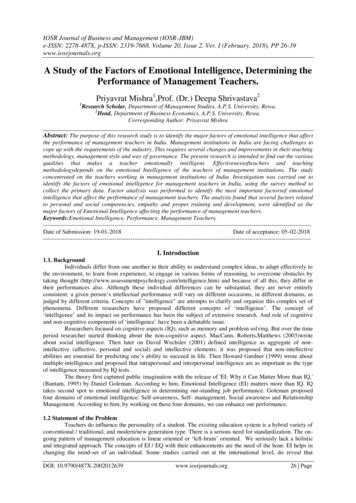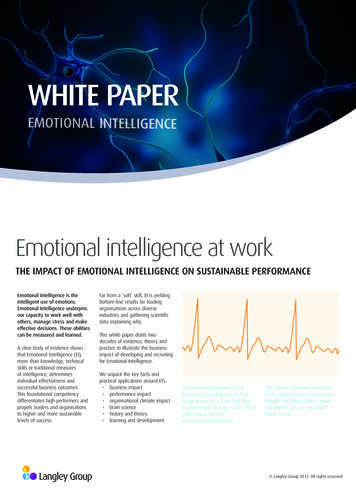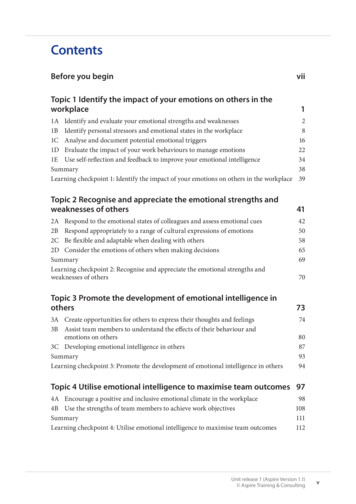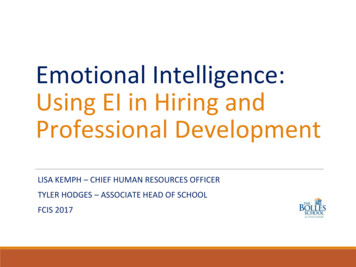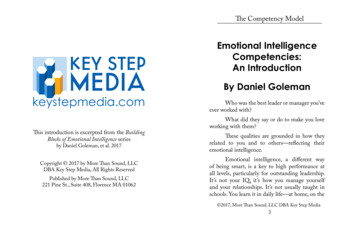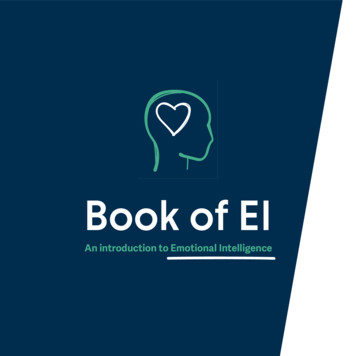
Transcription
online.com/bookofEIm@psionline.comAn introduction toEmotionalIntelligencein the workplaceBook of EIAn introduction to Emotional Intelligence
About PSIPSI Talent Management iswhere people meet potential.PSI helps organisations attract,recruit, develop and retaintalent, globally.Bringing together insightfulassessment and inspirationaldevelopment, PSI blends thebest emerging technologywith leading content andconsulting expertise.21 Why Emotional Intelligence matters 42 Our approach to Emotional Intelligence 123 Developing your Emotional Intelligence 224 The Emotionally Intelligent organisation 345 Measuring the impact of Emotional Intelligence 426 References 543
Why EI mattersWhy EmotionalIntelligencemattersExplore the impact ofEmotional Intelligence onlWellbeinglEngagementlPerformanceThe business need forEmotional IntelligenceThe business case forEmotional IntelligenceEmotional Intelligencecan be developed45
Why EI mattersThe businessneed forEmotionalIntelligenceIn today’s workplace the need forEI is more important than ever.Our survey on 50 UK organisationsfound that 90% considered EI as‘important’ or ‘crucial’ to meetingtheir business needs.16When asked: What are the topissues you face at work?Leaders reported that 76% werepeople/relational and only 24%were financial/technical issues.2A global leadership research company that followed20,000 new hires over three years found 23% failedbecause of poor understanding and managementof emotions.3The Future of Jobs survey ranked EI as one of thetop 10 skills that would be required by 2022.47
Why EI mattersThe businesscase forEmotionalIntelligencePeople higher in EI demonstrate:Higher job performance5,6Greater job satisfaction7More organisational commitment7Better psychological well-being8Better physical health9Positive leadership impact10Research shows that EI is clearly relatedto key outcomes that help people thrivein their workplace and career.89
Why EI mattersEmotionalIntelligencecan bedevelopedNot only does EI predict jobperformance, we also know fromresearch that EI can be improvedthrough training.10Improvement in EI after trainingLarge changeModerate changeSmall changeMeta-AnalysisA11Meta-AnalysisB1211
Our approachOur approachto EmotionalIntelligenceDiscover the importance oflAttitudeslFeelingslBehaviourA formula for changeThe Emotional IntelligenceframeworkAwareness of our attitudesA method of development1213
Our approachA formulafor changeWe define EI as ‘how a personmanages their personalityto be both personally andinterpersonally effective’.EI is therefore the missing linkthat turns personality intoeffective performance.14Performance15
Our approachThe EmotionalIntelligenceFramework16Personal IntelligenceInterpersonal IntelligenceBehaviourSelf ManagementRelationship ManagementFeelingSelf AwarenessAwareness of OthersAttitudeSelf RegardRegard for Others 2019 PSI Services LLCEI starts with AttitudeEI is made up of differentparts, underpinned by ourAttitudes that fuel ourFeelings that driveour Behaviour.17
Our approach18To achieve sustainable improvementin behaviour, it is essential to adoptemotionally intelligent attitudes.SurvivalMindfulLow Regard for OthersHigh Self ensiveAuthentic 2019 PSI Services LLCAwareness ofour attitudes19
Our approachA method fordevelopmentResultsClimateHigher EI leads to effectiveleadership behaviour, which createsa positive organisational climatethat produces business results.20LeadershipEmotions (EI)Personality,Attitudeand Values 2019 PSI Services LLCOur approach to personal andleadership development is to startfrom the inside out.21
Developing EIDevelopingyour EmotionalIntelligenceHow are you feeling today?lStressedlBurned outlEnergisedlRenewedMaintain a positive attitudePay attention to feelingsNotice your behaviourBuild your resiliencePut Emotional Intelligenceinto practice2223
Developing EII’m not OKI’m OKSubmissiveIdealSelf-criticalPassive and lack confidenceOver-trusting and dependent‘I Lose – You Win’Value self and othersFeel confident and competentAuthentic and open to change‘I Win – You Win’Blocked potentialCriticalFeeling hopeless and stuckGive up and withdrawInflexible and rigid‘I Lose – You Lose’Blaming othersAggressive and arrogantMistrusting and too independent‘I Win – You Lose’ 2019 PSI Services LLCYou’re OKYou’re not OKWhen we hold a positiveattitude, we are more likely toperform at our best and bringout the best in others.Self RegardRegard for OthersMaintain apositiveattitudeActivity!Think about how much time you spend in each of these boxes.What triggers you to move into the red boxes?What helps you stay or get back into the green box?2425
Developing EIPay attentionto feelingsRes LLCvic usiasticTouchedAppreciatedLovingTrusting dfulHateusrioFuusvioEnsesBuThe key to developing EI is tonotice feelings and signs ofstress early. By being moreaware of our emotions and theemotions of others, we will beable to spend more time feelingenergised and renewed.High intensityLow intensityActivity!Try checking-in a couple of times a day, to start building up apattern of your feelings. What helps you to renew?2627
Developing EIUnder pressure our behaviourchanges and we may revertto defensive habits or rigidbehaviours that derail ReactiveCompliantGuardedAvoidantReliantIdealistic 2019 PSI Services LLCNotice yourbehaviourDefensive habits occurwhen we face difficult anddemanding situations.Activity!Which of these defensive behaviours do you recognise in yourself?How do they impact on your performance and relationships?2829
Developing EIAll too often an individual whoperforms effectively undernormal circumstances willdramatically derail when understress and adversity.SurviveHow we respondAdaptHow we adjustThriveHow we growRecover 2019 PSI Services LLCBuild yourresilienceHow we bounce backBy building personal resilienceit will make bouncing backquicker and easier.Activity!How well do you cope with setbacks? Use our model to thinkabout how you behave at each stage of the resilience cycle.3031
Developing EIPut EmotionalIntelligenceinto practiceThe emotional brain learns fromexperiential activity – doing ratherthan knowing. Creating newhabits requires repeated practiceover time to make change stick.Repeating a behaviour every dayfor 21 days is a useful way toget started.Activity!What specific behaviour at work would you most like to addressand change? Write down the benefits this new habit will give you.3233
EI Using Emotional Intelligenceto enhancelCollaborationlInnovationlProductivityAn integrated organisationThe emotionallyintelligent teamA positive leadership climate3435
EI organisationsAn emotionally intelligentorganisation is an integratedand interdependent whole,comprising of individuals,teams and the organisationall working towardsthe same goal.36In successful sationsareSelf RegardMoraleEncouragingRegard for OthersPositive ClimateInnovativeSelf AwarenessMotivationVisioningAwareness ofOthersOpennessTrustingSelf ementCollaborationCollaborative 2019 PSI Services LLCAnintegratedorganisation37
The emotionallyintelligent teamThe EI of an organisation is largelydependent on the EI of the teamsand individuals within alrespect 2019 PSI Services LLCEI organisationsEI provides the building blocks for effectiveteamwork and greater collaboration.3839
EI organisationsGI NCOMPETITIVELLINSPSTTEREDEMAN1341213254ATIVE5ILL AANBO R1 2 006JCA Global Ltd. 2019 PSI RIGID5TRA PPRTIVECIAEINUCSDCOG3WI40NIN4AVO I DWhen leaders exhibit Mindfulbehaviours, they generate apositive climate where peoplefeel inspired, motivated, andchallenged to move out of theircomfort zones and perform attheir best.VISIOCNTRO SS I VE5G OURAGINGI N ENCR H I NGA positiveleadershipclimateLU41
Impact of EIMeasuring theimpact ofEmotionalIntelligenceCreating a positive climate withEmotional suring Emotional IntelligenceEmotional Intelligence predictsleadership climateEmotional Intelligence predictskey aspects of work performanceEmotional Intelligence issustainableDon’t just take our word for it4243
Impact of EIMeasuringEmotionalIntelligence44Leadership ClimateIndicatorTeamTeam EmotionalIntelligence ProfileIndividualPAPI nce Profile360FeedbackEmotionalIntelligencePerformance 2019 PSI Services LLCA first step in creating anemotionally intelligentorganisation is to diagnosewhat’s working well andwhat could be improvedat an individual, team andorganisational level. We measureall levels of EI using our suite ofpsychometric tools.Organisation45
Impact of EIIn a research study of 108 leaders usingour EI diagnostics, we found that the EI ofleaders predicts the emotional climateor tone they set within the organisation,based on 360 feedback ratings.46Leaders with higher EI create aclimate that is:13Less –More gRigidAppreciative 2019 PSI Services 7
Impact of EIEmotionalIntelligencepredicts keyaspects of workperformanceIn a large-scale research study usingthe EI Profile across a wide rangeof organisations, we found that EIsignificantly predicted three majordimensions of work performance, asmeasured by managers’ ratings.48Job performance dimensionspredicted by EI14Striving and AdaptingDemonstrating drive for results andadapting to overcome challengesCollaborating and SupportingBuilding productive relationships andworking effectively with othersLeading and InfluencingCo-ordinating people, coachingothers, and inspiring them to success49
Impact of EIEmotionalIntelligence issustainableIn an organisational study ofover 300 people going throughour flagship three-day EIprogramme, we foundsubstantial improvementsin EI three months later.50Percentage improvement15BehaviourFeelingSelf Managementand RelationshipManagement bothSelf Awarenessand Awareness ofOthers bothimproved by:improved by:11%13%AttitudeSelf RegardRegard for Othersimproved by:improved by:21%10%51
Don’t justtake ourwordfor itThe EmotionalIntelligence modelis simple and at thesame time profound.The issue of attitudesis essential to achievea real change inyour behaviour.It was such a rich learningexperience, and I amsure my organisations willbenefit hugely from thepractical application thatEmotional Intelligencecan bring.52The Emotional IntelligenceProfile is practical andmeaningful. It allows you tofocus on the really importantaspects and gives useful tips toimprove these areas.Emotional Intelligence hasincreased my awareness ofothers, their needs and myinteraction with them. I feelmore confident and effectivein my decision making, whichmeans that things getdone quicker.53
References541Maddocks, J. (2015). The Emotional Intelligence ofthe human resources sector 2007-2015. JCA Global Ltd.2Freedman, J. & Stillman, P. (2016). The Business Case for EmotionalIntelligence. Six seconds.3Murphy, M. (2012). Hiring for attitude. McGraw-Hill.4The Future of Jobs Report (2018). World Economic Forum(p. ix). http://reports.weforum.org/future-of-jobs-2018 (p.v).5O’Boyle, E., Humphrey, R., Pollack, J., Hawyer, T. & Story, P. (2011).The relations between emotional intelligence and job performance:A meta-analysis. Journal of Organisation Behaviour, 32, 788-818.6Joseph, D. L., Jin, J., Newman, D. A., & O’Boyle, E. H. (2015). Why DoesSelf-Reported Emotional Intelligence Predict Job Performance?A Meta-Analytic Investigation of Mixed EI. Journal of AppliedPsychology, 100(2), 298-342.7Miao. C., Humphrey, R.H. & Qian. S. (2017). A meta-analysis of emotionalintelligence and work attitudes. Journal of Occupational andOrganizational Psychology, 90, 177-202.8Sánchez-Álvareza, N., Extremerab, N. & Fernández-Berrocalc, P. (2015).The relation between emotional intelligence and subjective well-being:A meta-analytic investigation. The Journal of Positive Psychology.August 1-10.9Martins, A., Ramalho, N. & Morin, E. (2010). A comprehensive meta-analysisof the relationship between emotional intelligence and health. Personalityand Individual Differences, 49, 554-564.10 Miao, C., Humphrey R.H. & Qian, S. (2016). Leader emotional intelligenceand subordinate job satisfaction. A meta-analysis of main mediator andmoderator effects. Personality and Individual differences, 102, 13-24.11 Mattingly, V., & Kraiger, K. (2019). Can emotional intelligence be trained?A meta-analytical investigation. Human Resource Management Review.29, pp. 140-155. (p. 152).12 Hodzic, S., Scharfen, J., Ripoll, P., Holling, H., & Zenasni, F. (2017).How Efficient Are Emotional Intelligence Trainings: A Meta-Analysis.Emotion Review Vol. 10 No. 2, 138-148.13 Maddocks. J. (2017). Does the Emotional Intelligence of leadersinfluence the emotional climate of the organisation? Assessment &Development Matters. Autumn 2017 – Vol. 9. No.3.14 Hughes, D. & Maddocks, J. (2018). How does Emotional Intelligencerelate to different aspects of performance? Paper presented at theDivision of Occupational Psychology Annual Conference, Stratfordupon-Avon, UK.15 Maddocks, J., Harris, C. & van der Vloodt (2020). Championingneurodiversity and emotional intelligence in the workplace. PSI talentmanagement. Case study.For more information on these and other related studies refer to:Maddocks, J. & Hughes, D. (2019). The impact of Emotional Intelligencein the Workplace. An evidence-based review. PSI talent management. 2021 PSI Services, LLC. All rights reserved.PSI, the PSI logo, PAPI and the PAPI logo are registered trademarks of PSI Services LLC.EIP3 and the EIP logo are trademarks of PSI Services LLC.55
To find out more visit psionline.com/emotional-intelligenceor email us at talentteam@psionline.com
1 Why Emotional Intelligence matters 4 2 Our approach to Emotional Intelligence 12 3 Developing your Emotional Intelligence 22 4 The Emotionally Intelligent organisation 34 5 Measuring the impact of Emotional Intelligence 42 6 References 54 2 3 About PSI PSI Talent Management is where people meet potential. PSI helps organisations attract, recruit, develop and retain
